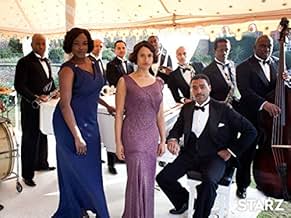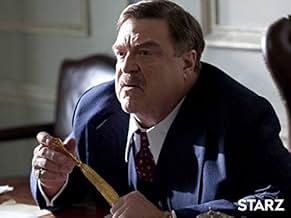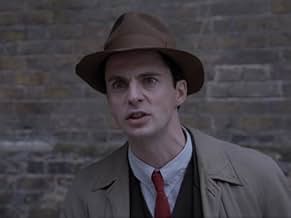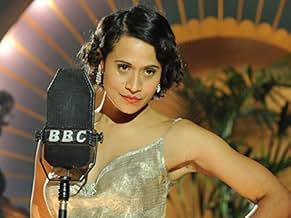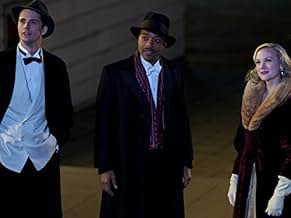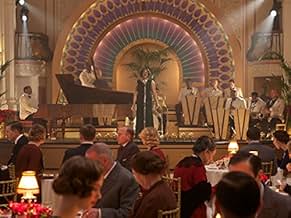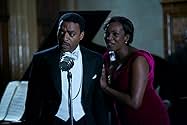CALIFICACIÓN DE IMDb
7.4/10
2.9 k
TU CALIFICACIÓN
Una banda de jazz adquiere fama y popularidad en los años 30, al tiempo que se ve envuelta en una intrincada red de intriga, misterio y suspenso con la élite de la sociedad londinense.Una banda de jazz adquiere fama y popularidad en los años 30, al tiempo que se ve envuelta en una intrincada red de intriga, misterio y suspenso con la élite de la sociedad londinense.Una banda de jazz adquiere fama y popularidad en los años 30, al tiempo que se ve envuelta en una intrincada red de intriga, misterio y suspenso con la élite de la sociedad londinense.
- Nominado a 1 premio Primetime Emmy
- 5 premios ganados y 16 nominaciones en total
Explorar episodios
Opiniones destacadas
No idea what to expect, but became totally hooked for these reasons: 1. Intelligent dialogue and storyline. A very well researched period piece dealing with both early 20th century British culture (a little American too); influence of music in culture (in this case mostly jazz); aristocracy relations with the poor (things never change); black (and other groups) relations with white power (money, politics, etc.). 2. Superb acting. 3. Superb period singing and accompanying music. 4. Most importantly for a quality film is attention to detail. 5. Suspenseful drama (Whodunit?). 6. Left room for a continuation which, unfortunately, doesn't appear to be in the works. 7. Interesting final episode of tidying up loose ends, even interviewing the dead as if they never died.
Cannot understand the current rating of this outstanding drama. The story, set over a few weeks in 1933, follows a talented black leader of a jazz band as he tries to get his band established in the London club and hotel scene. He soon finds he is meeting with royalty but that something dark is also going on.
Dancing on the Edge explores the slimy corruption of real evil as royalty, masonry, bigotry and sensuality all combine to provide a very particular view of the upper reaches of British Society.
The production values are excellent, and the 1930's are recreated in remarkable detail. The acting is uniformly excellent, with Chiwetell Ejiofor providing a compelling performance of a man caught up in circumstances spinning beyond his control.
Highly recommended as BBC drama at its best.
Dancing on the Edge explores the slimy corruption of real evil as royalty, masonry, bigotry and sensuality all combine to provide a very particular view of the upper reaches of British Society.
The production values are excellent, and the 1930's are recreated in remarkable detail. The acting is uniformly excellent, with Chiwetell Ejiofor providing a compelling performance of a man caught up in circumstances spinning beyond his control.
Highly recommended as BBC drama at its best.
For so many people not liking this, it has a high rating here on IMDb. I enjoyed it but see its flaws.
I am not familiar with the work of Stephen Poliakoff, so I can't comment on the criticisms of him.
The series is about a black jazz band in the 1930s who is discovered by a music journalist, Stanley Mitchell (Matthew Goode). With Wesley's help, the group is booked at the upscale Imperial Hotel and even entertain Prince George (erroneously described during the program as the Prince of Wales, who was actually Edward, Prince of Wales).
The band becomes successful and is written up often by Mitchell. With two talented singers (Wunmi Mosaku and Angel Coulby), they come to the attention of a record company and radio. But tragedy strikes, and the ensuing events threaten to ruin the band.
I'm at a disadvantage here because I'm not familiar with early '30s jazz music, but the critiques say the music presented is actually from a decade later. The songs are original to the production, which were also criticized. The producers certainly could have found actual songs, but I suppose they didn't want to pay for the rights. A couple of the songs weren't very good.
It's an expensive production with some excellent actors: Goode, who I've always loved, Chiwetel Ejiofor as Louis Lester, the leader of the band, Anthony Head, John Goodman, Tom Hughes, and Jacqueline Bisset. Very formidable.
There was also criticism that the series did not really evoke the '30s. I thought it looked wonderful, particularly the hotel scenes. But I agree, there was something missing in the period feel.
Fascinating to me was the statement in the series that the Brits didn't know what Americans sounded like until the advent of talking pictures, as well as the talk of the wireless. One really does get the feeling of limited communication and how far we've come.
Suspenseful, well-acted, this could have been more fascinating with some stronger writing, attention to period details, and maybe some cutting, perhaps to four episodes instead of six.
The research wasn't perfect -besides the Prince of Wales ID, there was also the reference to Clark Gable. In 1933, Clark Gable was just coming onto the radar in the U. S. Ronald Colman would have been much better. The devil is in the details.
I am not familiar with the work of Stephen Poliakoff, so I can't comment on the criticisms of him.
The series is about a black jazz band in the 1930s who is discovered by a music journalist, Stanley Mitchell (Matthew Goode). With Wesley's help, the group is booked at the upscale Imperial Hotel and even entertain Prince George (erroneously described during the program as the Prince of Wales, who was actually Edward, Prince of Wales).
The band becomes successful and is written up often by Mitchell. With two talented singers (Wunmi Mosaku and Angel Coulby), they come to the attention of a record company and radio. But tragedy strikes, and the ensuing events threaten to ruin the band.
I'm at a disadvantage here because I'm not familiar with early '30s jazz music, but the critiques say the music presented is actually from a decade later. The songs are original to the production, which were also criticized. The producers certainly could have found actual songs, but I suppose they didn't want to pay for the rights. A couple of the songs weren't very good.
It's an expensive production with some excellent actors: Goode, who I've always loved, Chiwetel Ejiofor as Louis Lester, the leader of the band, Anthony Head, John Goodman, Tom Hughes, and Jacqueline Bisset. Very formidable.
There was also criticism that the series did not really evoke the '30s. I thought it looked wonderful, particularly the hotel scenes. But I agree, there was something missing in the period feel.
Fascinating to me was the statement in the series that the Brits didn't know what Americans sounded like until the advent of talking pictures, as well as the talk of the wireless. One really does get the feeling of limited communication and how far we've come.
Suspenseful, well-acted, this could have been more fascinating with some stronger writing, attention to period details, and maybe some cutting, perhaps to four episodes instead of six.
The research wasn't perfect -besides the Prince of Wales ID, there was also the reference to Clark Gable. In 1933, Clark Gable was just coming onto the radar in the U. S. Ronald Colman would have been much better. The devil is in the details.
Firstly, at the time of writing (16 September 2013) the information for this on the main page is incorrect. It says this film/series is not yet released. However, I've just watched all 5 episodes on DVD (2 DVDs to be precise), plus the extra almost 1 hour "interview" between Stanley and Louis. The DVD release date was March 2013.
Like another reviewer I simply don't understand some of the poor ratings for this film. It was an immaculate production with an excellent cast for, I think, a cracking, well written story. It has style, suspense, humour, sensuality, good looks, great music and, as with so much of Stephen Poliakoff's work, a lot of intelligent dialogue and some fairly long scenes. But that's why I'm a fan of Poliakoff's work - it is literate, well researched and observed, and you have to pay attention. It rewards that attention many time over.
I must say there were some performances that were a revelation to me. Jacqueline Bisset for a start, and the late Mel Smith. But everyone was really outstanding in the parts they played. Joanna Vanderham is astonishingly mature well beyond her years (19 or 20 years old during the production) and is destined I feel to be a great actress. One cannot comment on this production without mentioning the singers - 2 established actresses who had never sung in public, in theatre, TV or on film before. They did their own singing and were amazingly good.
Like another reviewer I simply don't understand some of the poor ratings for this film. It was an immaculate production with an excellent cast for, I think, a cracking, well written story. It has style, suspense, humour, sensuality, good looks, great music and, as with so much of Stephen Poliakoff's work, a lot of intelligent dialogue and some fairly long scenes. But that's why I'm a fan of Poliakoff's work - it is literate, well researched and observed, and you have to pay attention. It rewards that attention many time over.
I must say there were some performances that were a revelation to me. Jacqueline Bisset for a start, and the late Mel Smith. But everyone was really outstanding in the parts they played. Joanna Vanderham is astonishingly mature well beyond her years (19 or 20 years old during the production) and is destined I feel to be a great actress. One cannot comment on this production without mentioning the singers - 2 established actresses who had never sung in public, in theatre, TV or on film before. They did their own singing and were amazingly good.
A clever story with enough intrigue to keep it exciting. The characters are all very interesting and their chemistry works well together.
Stanley writes and edits a local music rag and hears Louis Lester's band in a local dive. He decides to help them become successful and succeeds.
I wouldn't read the blurbs here accompanying each episode because they describe exactly what happens in that particular episode.
The production values, camera work, sets, costumes, make-up and hair are all great and authentic. There is just the right balance between the drama and the music.
They don't get too bogged down with the politics of "negro" prejudice which is refreshing. Yet we are always aware of it in the background.
My only disappointment was I felt the ending of Episode 5 was extremely rushed with a lack of the usual explanation and depth.
I assumed it was the final episode until I saw Episode 6 listed in the TV guide for tonight.
The Interview was something Stanley always wanted but I found the episode boring and superfluous especially since it wasn't the interview I was expecting. We didn't need this companion piece. They would have been better spending more time on the the end of the series although I think Stanley left us with a wimpy cliffhanger for a potential Season 2.
It's almost as if they ran out of funding, time or backing and several of the main stars left before the end of Episode 5. Episode 6 was improvised and didn't make any sense because Stanley obviously had been gathering interview material from the start.
Stanley writes and edits a local music rag and hears Louis Lester's band in a local dive. He decides to help them become successful and succeeds.
I wouldn't read the blurbs here accompanying each episode because they describe exactly what happens in that particular episode.
The production values, camera work, sets, costumes, make-up and hair are all great and authentic. There is just the right balance between the drama and the music.
They don't get too bogged down with the politics of "negro" prejudice which is refreshing. Yet we are always aware of it in the background.
My only disappointment was I felt the ending of Episode 5 was extremely rushed with a lack of the usual explanation and depth.
I assumed it was the final episode until I saw Episode 6 listed in the TV guide for tonight.
The Interview was something Stanley always wanted but I found the episode boring and superfluous especially since it wasn't the interview I was expecting. We didn't need this companion piece. They would have been better spending more time on the the end of the series although I think Stanley left us with a wimpy cliffhanger for a potential Season 2.
It's almost as if they ran out of funding, time or backing and several of the main stars left before the end of Episode 5. Episode 6 was improvised and didn't make any sense because Stanley obviously had been gathering interview material from the start.
¿Sabías que…?
- TriviaJenna Coleman and Tom Hughes would go on to star together as Queen Victoria and Prince Albert in the ITV period drama Victoria (2016).
- ErroresThe musical style of Louis Lester's band, and especially the vocal styles of his singers and the sorts of songs they perform, are typical of the 1950's, not the 1930's.
- ConexionesFeatured in The Wright Stuff: Episode #18.20 (2013)
Selecciones populares
Inicia sesión para calificar y agrega a la lista de videos para obtener recomendaciones personalizadas
- How many seasons does Dancing on the Edge have?Con tecnología de Alexa
Detalles
- Fecha de lanzamiento
- País de origen
- Idioma
- También se conoce como
- 邊緣之舞
- Locaciones de filmación
- Severn Valley Railway, Shropshire, Inglaterra, Reino Unido(Folkestone and South Bromley stations)
- Productoras
- Ver más créditos de la compañía en IMDbPro
Contribuir a esta página
Sugiere una edición o agrega el contenido que falta




